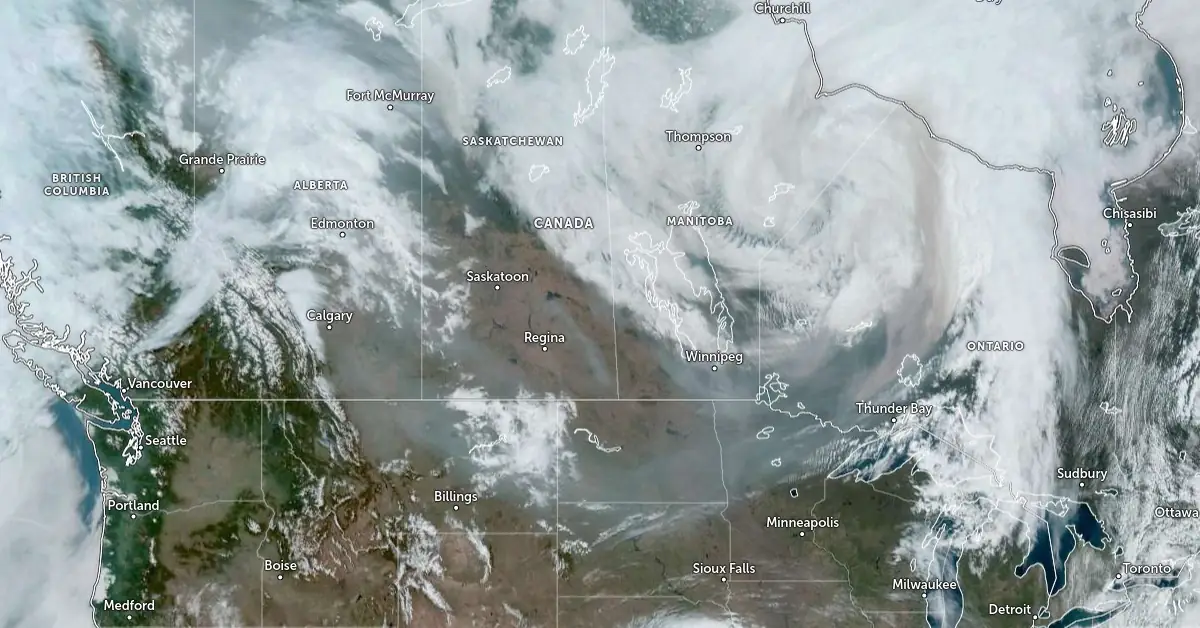Rapidly spreading Canadian wildfires force thousands to evacuate, degrade air quality in U.S.

Multiple wildfires burning in British Columbia and Manitoba have forced thousands of people to evacuate and spread hazardous smoke into the northern United States, prompting air quality alerts.
Wildfires burning in the Canadian provinces of British Columbia and Manitoba since May 10, 2024, resulted in widespread evacuations, significant damage, and hazardous smoke drifting into the northern United States.
According to the JRC Global Wildfire Information System (GWIS), more than 42 000 ha (103 784 acres) have burned in British Columbia alone.
As of May 13, an evacuation order affects more than 3 500 people in the Northern Rockies regional municipality and Fort Nelson First Nation in British Columbia. One hospital has already been evacuated, and a section of the Alaska Highway is closed.
Fires near Fort Nelson, #BritishColumbia, #Canada May 11th, 2024 #Copernicus #Sentinel-3 Full-size https://t.co/RxtMm7UNS5 #OpenData #SciComm #RemoteSensing Image is about 271 kilometers wide #FortNelson #fire #wildfire #BCFire pic.twitter.com/XgKj1ievUS
— Pierre Markuse (@Pierre_Markuse) May 12, 2024
BC’s emergency management minister, Bowinn Ma, described the conditions in the north as extremely challenging. The wildfire service’s fire behavior specialist, Ben Boghean, noted that extreme fire behavior, exacerbated by years of drought and a below-normal snowpack this past winter, poses a significant threat to firefighting crews.
Rob Fraser, mayor of the Northern Rockies regional municipality, reported on May 13 that fire crews and emergency workers were preparing for a “last stand” if the Parker Lake wildfire, which has grown to over 5 280 ha (13 043 acres), advances into the town.
Cliff Chapman of the BC Wildfire Service urged the remaining 100 to 150 people in the community to evacuate immediately. Fraser warned that essential resources such as water pressure and electricity might be redirected to support firefighting efforts.

In Manitoba, approximately 35 000 ha (86 487 acres) have burned across Flin Flon and The Pas municipalities, leading to the evacuation of 600 people in Cranberry Portage. Sections of one highway and one railway have been closed.
“We could be fighting that fire a month from now,” Earl Simmons, the director of the Manitoba Wildfire Service, told reporters on the afternoon (LT) of May 13.
This fire was seen moving at ‘unbelievable’ speeds, spreading at a rate of about 2 km (1.2 miles) at the front and about 1 km (0.6 miles) at its sides, Simmons said, adding that he has never seen a fire move like this in his 40 years of service with wildfires.
This fire is believed to be started by lightning strikes on May 9.
Wildfire season ramps up in Western Canada, sparking evacuation orders and alerts in British Columbia and Alberta. #BCFire #ABFire
— The Weather Network (@weathernetwork) May 13, 2024
Watch more video: https://t.co/PuG7OqxDhr pic.twitter.com/zNVZhQBmRn
Are you a resident or evacuee currently impacted by the wildfires in Manitoba? Connect with 211 Manitoba for more information: https://t.co/lwsf2gwe01. #MBFire pic.twitter.com/GDSH6Lu8uY
— Manitoba Government (@MBGov) May 13, 2024
We almost made it to mid-May, but unfortunately, the air quality across the Prairies is worsening due to a multi-year wildfire outbreak. Holdover fires have rekindled in the past few days in NE BC… #BCFires pic.twitter.com/Vv2HpZfd5J
— Tyler Hamilton (@50ShadesofVan) May 12, 2024
At least 37 of the 141 active fires in Canada are classified as “out of control,” including one in the Fort Nelson Indian Reserve.
Air quality alerts are in effect for much of Alberta and surrounding provinces, as well as Minnesota and Wisconsin. Over the weekend, Edmonton experienced red-tinged skies and hazardous air quality due to wildfires to its north.
Northern Minnesota’s Air Quality Index (AQI) has ranged between 150 and 200, indicating “unhealthy” conditions, and at times exceeded 200, reaching “very unhealthy” levels. Bemidji, Minnesota, recorded a 212 AQI on Sunday, May 12, making it one of the worst air quality locations globally.

GWIS forecasts indicate that fire danger will remain high to extreme in British Columbia and low to moderate in Manitoba over the next 24 hours.
As of this year, Canada has experienced over 950 wildfires, nearly triple the number from three weeks ago. In 2023, Canada experienced a record number of wildfires, resulting in widespread smoke impacts in the U.S. and the evacuation of over 250 000 Canadians. While there were no civilian casualties, at least four firefighters died combating the fires.
References:
1 Wildfire that forced evacuation of Cranberry Portage could take weeks to put out – The Weather Network – May 14, 2024
2 Canada’s fire season erupts, sending harmful smoke into United States – The Washington Post – May 13, 2024
Featured image credit: NOAA/GOES-East, Zoom Earth, The Watchers. Acquired at 15:50 UTC on May 12, 2024

Commenting rules and guidelines
We value the thoughts and opinions of our readers and welcome healthy discussions on our website. In order to maintain a respectful and positive community, we ask that all commenters follow these rules.